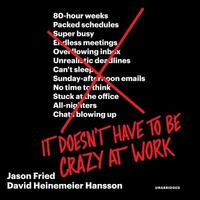Take a photo of a barcode or cover
hopeful
reflective
fast-paced
Interesting and light read. This book has a lot of insights about how to run a company that doesn’t drive its employees crazy and burned out. It’s a good book for most people that work in consulting these days.
A lot of good advice. I think the “chapters” (each has 2 pages) could be bigger and go a little more into the details of how they could accomplish those things at Basecamp.
A lot of good advice. I think the “chapters” (each has 2 pages) could be bigger and go a little more into the details of how they could accomplish those things at Basecamp.
Overall, I liked it very much. Some ideas, approaches were quite new for me. Just can't think but wonder, which statements from the book will no longer be true in the near future and to see just any shortcomings of Basecamp. It's pictured as the perfect model, but I can't keep myself from doubting it.
Reads like a series of brief blog posts which makes it feel quick and concise but in the downside the authors make a lot of declarations about how things are without providing a whole lot of context as to why or how they're made to work.
I wish I worked someplace that cared about its employees. :(
Truly shows capitalism has no reason to be like that.
Great book on how to run a calm company.
It's not a heavy book, but has enough content to explore all the things Jason & David do @ basecamp. Must read if you are planning to start of a company!
It's not a heavy book, but has enough content to explore all the things Jason & David do @ basecamp. Must read if you are planning to start of a company!
Easy quick casual read. Opinionated. I agree with the theme but didn't agree with a lot of the specific practices. I like their vibe though. A little bit over-combative perhaps but it causes you to be like, wait if I want it to not have to be crazy at work maybe I have to take stock and take charge of my situation, since that's not always the default.
This book tell the interesting tale of company Basecamp, that limits its ambition to prioritize stability over growth. That then translates to giving people great compensation (top 10% pay of San Francisco compensation, regardless of where you live), great work hours (no working after hours, plus four-day-weeks during Summer, and focus on delivery instead of hours), and great benefits (vacation fund, education fund).
On one hand, it's great to see that a company is able to achieve such standards that the average employee could only dream of. On the other hand, companies that can do this are, in my opinion, privileged few - they must have consistent revenue from an evergreen successful product.
I recommend reading this book for a "what if" evaluation of work experience.
The book also has some insights into how to structure work so it's remote-first. There may be better resources out there if that's your focus. But, granted, this is the story of a company that has been doing remote-first successfully for decades.
On one hand, it's great to see that a company is able to achieve such standards that the average employee could only dream of. On the other hand, companies that can do this are, in my opinion, privileged few - they must have consistent revenue from an evergreen successful product.
I recommend reading this book for a "what if" evaluation of work experience.
The book also has some insights into how to structure work so it's remote-first. There may be better resources out there if that's your focus. But, granted, this is the story of a company that has been doing remote-first successfully for decades.
Quite obvious but too often forgotten - inspiring rules that Basecamp follows, which inspired me to lessen the noise and hassle in my environment as a whole. Give this book to your managers and colleagues, especially if they play tetris with your calendar, arrange meetings about meetings about meetings and you're always surrounded by FOMO in terms of messages and decisions (instead - choose JOMO).




